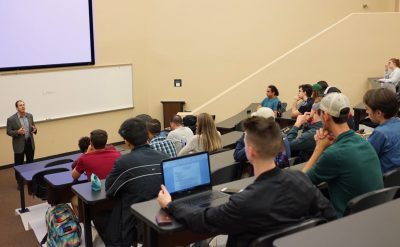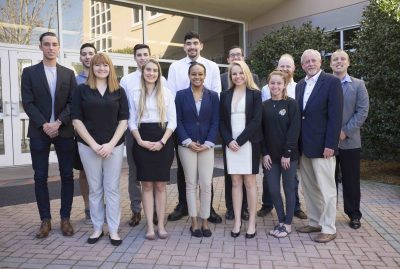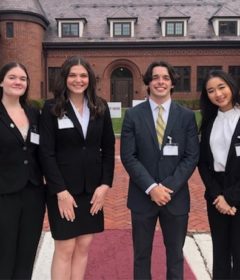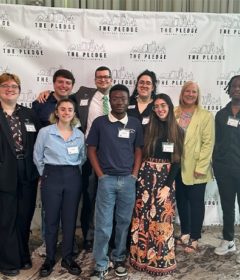Startup Enterprise

Similarly, Stetson’s School of Business Administration is using entrepreneurship to drive its own sphere of influence — in academics, community involvement and economic impact.
Students are being equipped with all the real-world skills necessary to succeed in an ever-expanding and ever-changing entrepreneurial environment. The local and regional business community is being engaged on multiple levels. Meanwhile, by all statistical counts, as the university’s initiatives achieve success and entrepreneurship blooms, the economy will benefit.
Welcome to the Joseph C. Prince Entrepreneurship Program.
The program, housed in the Department of Management, has added a new major — Bachelor of Business Administration in Entrepreneurship — along with an advisory board stocked with local business leaders and a renewed commitment toward innovative thinking. Further, the program’s director, Bill Jackson, D.B.A., has made it his mission to not limit potential impact — he seeks to connect students from all across campus.
That’s just for starters (and for startups).

“When I got [to Stetson] a little over a year ago, the charge was to advance the program,” says Jackson. “We asked what needed to be in place to become a nationally recognized program, and we’ve made great strides to that end.”
Jackson, who was responsible for building the entrepreneurial program from the ground up at the University of South Florida – St. Petersburg, is a nationally recognized leader in entrepreneurship education. In 2015, the U.S. Association for Small Business and Entrepreneurship named him the Entrepreneur Educator of the Year.
“I was drawn to Stetson because there’s a large demographic of students involved in family business, and the faculty embraces the spirit of true entrepreneurship,” Jackson continues. “We’re creating an entrepreneurial mindset with a real focus on the students, teaching them to solve real-world problems and inspiring them to make the world a better place.”

Notably, the Joseph C. Prince Entrepreneurship Program comes largely by virtue of charitable giving from Tom Prince ’67, a successful hotel entrepreneur. Founded in the early 1990s, the program was named in honor of Prince’s father.
In addition, other components already were in place for success, such as the Coleman Fellows. In 2014, the Coleman Foundation named Stetson one of 19 colleges and universities nationwide to participate in its Faculty Entrepreneurship Fellows Program. The program creates awareness and builds support for entrepreneurial education in interdisciplinary departments across the campuses of participating institutions.
Now, Jackson is seeking to establish a full-blown supportive, nurturing “entrepreneurial ecosystem” — under the moniker HatterTrep (Hatter Entrepreneur).
The new major became a reality in fall 2017, with all courses designed to help students through the various phases of entrepreneurship. “We focus on several toolboxes when it comes to skill sets,” Jackson explains. “Creative problem solving is critical, as we want to spur on innovation and creativity. The key is taking basic business skill sets such as accounting, marketing and finance, and tailoring them to the uniqueness of an entrepreneurial endeavor.”
Jackson also wanted to engage students by getting them involved in competitions and community business interests. Mentorship was deemed a chief component. So, Jackson looked to local professionals who could help guide students along the way.
In turn, Jackson tapped Luis Paris ’01, M.B.A. ’07, as the program’s assistant director. Paris had been a Stetson instructor of international business and new venture creation, and had launched three startup businesses in the past. He is particularly active in the business community with organizations such as 1 Million Cups Daytona Beach, Innovate Daytona, the Daytona Regional Chamber of Commerce and the CEO Business Alliance.

Perhaps most importantly, Paris has a keen understanding of the modern business landscape.
“Businesses are looking for an entrepreneurial mindset,” Paris says. “They want to innovate and need people who are capable of understanding opportunities, solving problems creatively and building a business model around that solution.”
Jackson also is working to integrate entrepreneurship throughout the university. Great ideas come from all students across campus regardless of their majors, Jackson believes. As a result, he wants to make it possible to “vet” those ideas to experts and develop them.
Jackson compares what he is attempting to accomplish with what occurred in Florence, Italy, in the 14th century. At that time, one of the most powerful families was the Medicis. The family and other like-minded supporters decided to bring together great thinkers of the day from many disciplines and cultures from around the world. Not only were sculptors, poets, philosophers and painters included, but also scientists and those focused on business and trade. They came together, shared thoughts and ideas, and broke down the barriers between disciplines and cultures.
The result was the beginning of the Renaissance, with Florence at the center of activity. The explosion of creative ideas and innovation has been referred to as the Medici Effect.
“The vision of the entrepreneurship program is to create a Medici Effect at Stetson University and the community around it,” Jackson says.
To create that kind of connectivity, Jackson is intent on building a facility outside of the School of Business Administration. This “think tank” or “hatchery of ideas” will pull everything together and create a community of creativity and entrepreneurship, he says.
Similarly, the establishment of an advisory board brings stature and experience. Specifically, the Entrepreneurship Advisory Board consists of local business leaders and entrepreneurs who will be available to consult and mentor, as well as judge student competitions.
Among the supporters of entrepreneurship at Stetson is Board of Trustees Chair Joe Cooper ’79, M.B.A. ’82, retired past president of Big Lots Canada and executive vice president of Big Lots Inc. Cooper is especially excited about the multiple academic options now being offered.
“Students can tap into these [entrepreneurship] courses regardless of their major,” says Cooper. “That’s going to benefit them in whatever direction their careers take them.”
Cooper points to the general business environment, where companies are seeking employees with broad vision.
“Regardless of how large the overall business is, the entrepreneurial mindset is more critical now than ever. Ideas need to be tapped, nurtured and driven through an organization, regardless of whether there are 10 or 10,000 associates at that company,” Cooper explains.
With much now in place, Jackson believes the business school is on the way to creating a nationally recognized program — for students, the community and the economy. Soon, he says, people will recognize the connection between what is happening at Stetson and the entrepreneurial activity occurring throughout the region.
Jackson is confident the university’s own startup strategies will pay off.
“This generation isn’t scared by entrepreneurship,” he concludes. “They have great ideas, and we want to provide the mechanism to help fine-tune those ideas.”
-Jack Roth
Note: This article appears in the the Spring 2018 issue of Stetson University Magazine.



